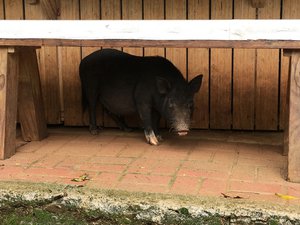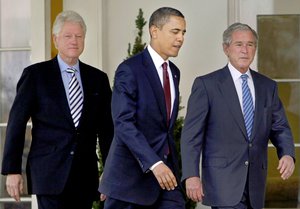
Mother (video game)
Mother (Japanese: マザー, MOTHER), released outside Japan as EarthBound Beginnings, is a 1989 Japanese role-playing video game developed by Ape and published by Nintendo for the Famicom (Nintendo Entertainment System). The game is modeled on the gameplay of the Dragon Quest series, but is set in the late 20th century United States, unlike its fantasy genre contemporaries. Mother follows the young Ninten as he uses his great-grandfather's studies on psychic powers to fight hostile, formerly inanimate objects and other enemies. The game uses random encounters to enter a menu-based, first-person perspective battle system. It is the first game in the Mother series and was followed by two sequels, EarthBound in 1994 and Mother 3 in 2006.
The game's writer and director, Shigesato Itoi, pitched the game concept to Shigeru Miyamoto while visiting Nintendo's headquarters for other business. Though Miyamoto denied the proposal at first, he eventually gave Itoi a development team. The game was released in Japan on July 27, 1989. A North American version was localized into English, but was abandoned as commercially nonviable. A copy of this prototype was later found and circulated on the Internet under the unofficial, fan-created title EarthBound Zero. The game was eventually localized and released worldwide under the name EarthBound Beginnings for the Wii U Virtual Console on June 14, 2015.
Marvel 2099: One Nation Under Doom
Marvel 2099: One Nation Under Doom was a cancelled game for the PlayStation developed by Mindscape Inc. It was to be loosely based on the "One Nation Under Doom" storyline in Marvel's Doom 2099 comic. It was envisioned as a 2D side-scroller with 3D rendered characters.
In February 1996, Mindscape announced they would produce a video game based on the Marvel 2099 universe. Promoted as one of their top five games for the year, the game would be released on December 1, 1996, just in time for the Christmas rush. Two versions were announced: PlayStation and Windows 95.
By May 1996, CD-ROM and VHS video demos were being shipped to game magazines for pre-release reviews, along with a one-page color brochure. The first public demo was shown at the E3 show, and featured a playable single level of the Punisher 2099 fighting SHIELD troops, and also opening menus and some cut scenes. Electronic Gaming Monthly had a quarter-page preview of the game in their July 1996 issue and a half page preview in their August 1996 issue, showing screenshots of actual gameplay, and a group shot of the player characters. At the 1996 San Diego Comicon, the Mindscape booth handed out brochures, and raffled off One Nation Under Doom pins, shirts, and posters. Some attendees were even allowed to play the demo at the booth, although no copies of the demo were distributed. September 1996 issue of 3D Design magazine had a cover story on the Marvel 2099 game. After July, due to financial troubles, ongoing production of the game slowed down, and eventually stopped, though the game was never officially canceled.

Mitt Romney presidential campaign, 2012
The 2012 presidential campaign of Mitt Romney, the 70th Governor of Massachusetts, was formally announced on June 2, 2011 at an event in Stratham, New Hampshire. Having previously run in the 2008 Republican primaries, Mitt Romney's campaign in the 2012 election was his second bid for the Presidency of the United States.
He filed his organization with the Federal Elections Commission as an exploratory committee and announced the organization in a video message on April 11, 2011. He became the party's presumptive nominee with his victory in the Texas primary on May 29, 2012.
On August 11, 2012, in Norfolk, Virginia, Romney announced that his running mate for vice president was Paul Ryan, the U.S. Congressman for Wisconsin's 1st congressional district.
On August 30, 2012, in Tampa, Florida, Romney formally accepted the Republican Party's nomination at the 2012 Republican National Convention.
Romney's campaign came to an end on November 6, 2012, upon defeat by incumbent President Barack Obama.
Microsoft Video 1
Microsoft Video 1 or MS-CRAM is an early lossy video compression and decompression algorithm (codec) that was released with version 1.0 of Microsoft's Video for Windows in November 1992. It is based on MotiVE, a vector quantization codec which Microsoft licensed from Media Vision. In 1993, Media Vision marketed the Pro Movie Spectrum, an ISA board that captured video in both raw and MSV1 formats (the MSV1 processing was done in hardware on the board).
Compression algorithm
Microsoft Video 1 operates either in a 8-bit palettized color space or in a 15-bit RGB color space. Each frame is split into 4×4 pixel blocks. Each 4×4 pixel block can be coded in one of three modes: skip, 2-color or 8-color. In skip mode, the content from the previous frame is copied to the current frame in a conditional replenishment fashion. In 2-color mode, two colors per 4×4 block are transmitted, and 1 bit per pixel is used to select between the two colors. In 8-color mode, the same scheme applies with 2 colors per 2×2 block. This can be interpreted as a 2-color palette which is locally adapted on either a 4×4 block basis or a 2×2 block basis. Interpreted as vector quantization, vectors with components red, green, and blue are quantized using a forward adaptive codebook with two entries.

The Game (rapper)
Jayceon Terrell Taylor (born November 29, 1979), better known by his stage name The Game (or simply Game), is an American rapper and actor. Game is best known as a rapper in the West Coast hip hop scene, and for being one of Dr. Dre's most notable protégés. Born in Los Angeles, California, he released his first mixtape You Know What It Is Vol. 1 in 2002, and landed a record deal with the independent label Get Low Recordz owned by JT the Bigga Figga. The Game's mixtape reached the hands of Sean Combs, founder of Bad Boy Records, who originally was on the verge of signing him to his label. Five months later, he was discovered by Dr. Dre who listened to the mixtape and signed him to his Aftermath Entertainment label in 2003. He rose to fame in 2005 with the success of his debut album The Documentary (2005) and Doctor's Advocate (2006). The Recording Industry Association of America certified his album The Documentary double platinum in March 2005 and it has sold over five million copies worldwide.

Seduction
Seduction is the process of deliberately enticing a person, to lead astray, as from duty, rectitude, or the like; to corrupt, to persuade or induce to engage in sexual behaviour. The word seduction stems from Latin and means literally "to lead astray". As a result, the term may have a positive or negative connotation. Famous seducers from history or legend include Lilith, Giacomo Casanova and the fictional character Don Juan. Seduction as a phenomenon is not the subject of scientific interest, although similar, more specific terms like short-term mating, casual sex or mating strategies are used in evolutionary psychology. The Internet enabled the existence of a seduction community which is based on pseudoscientific discourse on seduction.
Seduction, seen negatively, involves temptation and enticement, often sexual in nature, to lead someone astray into a behavioral choice they would not have made if they were not in a state of sexual arousal. Seen positively, seduction is a synonym for the act of charming someone — male or female — by an appeal to the senses, often with the goal of reducing unfounded fears and leading to their "sexual emancipation" Some sides in contemporary academic debate state that the morality of seduction depends on the long-term impacts on the individuals concerned, rather than the act itself, and may not necessarily carry the negative connotations expressed in dictionary definitions.

Tennis scoring system
A tennis tournament is organized into matches between players (for singles tournaments) or teams of two players (for doubles tournaments). The matches of a tournament are grouped into rounds. In round 1, all players (or teams) are paired and play against each other in matches. The losers are said to leave, or be out. They no longer compete in the tournament (this is single elimination). The winners are again paired to play in the matches of the next round. The tournament continues until the quarterfinal round (having eight players or teams playing in pairs), then the semifinal round (having four players or teams playing in pairs), and finally the final round (having only two players or teams) are played. The winner of the final round is declared the winner of the entire tournament.
A tennis match is composed of points, games, and sets. A match is won when a player or a doubles team wins the majority of prescribed sets. Traditionally, matches are either a best of three sets or best of five sets format. The best of five set format is typically only played in the Men's singles or doubles matches at Majors and Davis Cup matches.

Mother (video game)
Mother (Japanese: マザー, MOTHER), released outside Japan as EarthBound Beginnings, is a 1989 Japanese role-playing video game developed by Ape and published by Nintendo for the Famicom (Nintendo Entertainment System). The game is modeled on the gameplay of the Dragon Quest series, but is set in the late 20th century United States, unlike its fantasy genre contemporaries. Mother follows the young Ninten as he uses his great-grandfather's studies on psychic powers to fight hostile, formerly inanimate objects and other enemies. The game uses random encounters to enter a menu-based, first-person perspective battle system. It is the first game in the Mother series and was followed by two sequels, EarthBound in 1994 and Mother 3 in 2006.
The game's writer and director, Shigesato Itoi, pitched the game concept to Shigeru Miyamoto while visiting Nintendo's headquarters for other business. Though Miyamoto denied the proposal at first, he eventually gave Itoi a development team. The game was released in Japan on July 27, 1989. A North American version was localized into English, but was abandoned as commercially nonviable. A copy of this prototype was later found and circulated on the Internet under the unofficial, fan-created title EarthBound Zero. The game was eventually localized and released worldwide under the name EarthBound Beginnings for the Wii U Virtual Console on June 14, 2015.
Latest News for: mother (video game)
Gamer's Mom Throws Out $500,000 Worth of Games | Game Rant
Billie Eilish Destroys Body-Shamers: This Is Just How I Look!
Game On: Classic co-op game ‘Pandemic’ is more relevant than ever
For children, the gift of an experience can last a lifetime
 The Post and Courier
25 Nov 2020
The Post and Courier
25 Nov 2020
Despite COVID-19, family will be served by HHF
 Citizen Tribune
24 Nov 2020
Citizen Tribune
24 Nov 2020
Inside the Lives of Immigrant Teens Working Dangerous Night Shifts in Suburban Factories
Members of Atatiana Jefferson's family file suit against Fort Worth, ex-police officer
 News-Press Now
17 Nov 2020
News-Press Now
17 Nov 2020
Did You Have A Gaming Buddy Growing Up?
Siobhan Connally’s Ittybits & Pieces: Spending time in COVID quarantine
 The Record
14 Nov 2020
The Record
14 Nov 2020
Swimmer Ryan Lochte miffed at his times in return to racing
 Courier Express
14 Nov 2020
Courier Express
14 Nov 2020
- 1
- 2
- Next page »
Article Search
Most Viewed
TVNZ | 04 Dec 2020
WorldNews.com | 02 Dec 2020
The Guardian | 04 Dec 2020
South China Morning Post | 04 Dec 2020
The Jerusalem Post | 03 Dec 2020





































